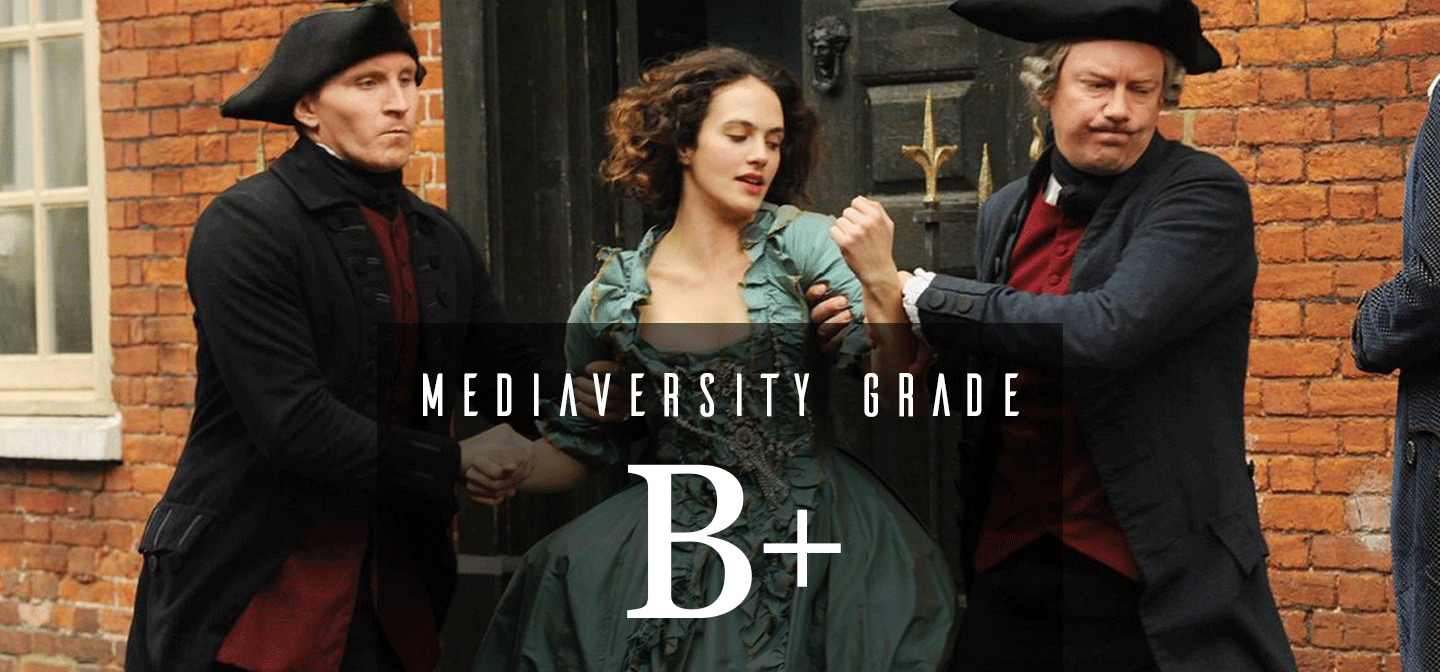Harlots - Season 1
“The single most refreshing aspect of Harlots is its inclusion of Black people in Georgian England.”
Title: Harlots
Episodes Reviewed: Season 1
Creators: Moira Buffini 👩🏼🇬🇧 and Alison Newman 👩🏼🇬🇧
Directors: Coky Giedroyc 👩🏼🇬🇧 (3 eps), China Moo-Young 👩🏻🇬🇧 (3 eps), and Jill Robertson 👩🏼🇬🇧 (2 eps)
Writers: Moira Buffini 👩🏼🇬🇧 (8 eps), Alison Newman 👩🏼🇬🇧 (8 eps), Hallie Rubenhold 👩🏼🇬🇧 (8 eps), Jane English 👩🏼🇬🇧 (2 eps), Cat Jones 👩🏼🇬🇧 (2 eps), and Debbie O’Malley 👩🏼🇬🇧 (1 ep)
Reviewed by Mimi 👩🏻🇺🇸
Read the Season 2 review here.
Technical: 4/5
When I first learned about that Hulu had picked up this series, I thought, “Yes!” A drama about fallen women in 18th century London? Yes, gimme! Created, directed, and written by all women? Yes, PLEASE! A trailer that prominently features Black actors with speaking roles? YES! YES! YES!
While plenty of cleavage and rustling skirts abound, what really sold me on Harlots is the show’s unflinching portrayal of sex work. The first episode opens by proclaiming that in 1793, “1 out of 5 women makes a living selling sex.” Far from glamorizing this history, the show does not shy away from the grim realities of the characters who struggle to survive in an era when women had little rights, were often regarded as property, and had few means to becoming financially independent. As such, rape and violence against women do figure into the storylines, so watch with care. But that’s not to say that Harlots isn’t fun: it’s filled with all the delicious scheming and fraught romance that one would expect from a good melodrama.
I would have scored this show 5/5 but we peg this category to traditional reviews to minimize bias, compromising with Metacritic (74) and Rotten Tomatoes (7/10 average, despite the 97% Fresh rating), which brings our score down by one point. Other critics cite jarringly modern music or being more ambitious than the show has room to explore.
Gender: 5/5
Does it pass the Bechdel Test? YES
The central conflict of the season revolves around two rival brothels. Samantha Morton anchors the action as Margaret Wells, a bawdy and unapologetic madam who has her sights set on moving her business to Greek Street in Soho, where the richer clientele frequent. Running one such high-class establishment, Lydia Quigley (Lesley Manville) hopes to sabotage Mrs. Wells’ plans for reasons beyond simple, cutthroat competitiveness; as a young girl, Mrs. Wells was sold off by her mother to work as a prostitute for Mrs. Quigley. We get a glimpse of the cruel, cyclical nature of prostitution, as Mrs. Wells attempts to auction off the virginity of her younger daughter, Lucy (Eloise Smyth), to help fund the move. The goal is for Lucy to become a famous courtesan and kept mistress like her older sister, Charlotte (Jessica Brown Findlay).
Women not only dominate the screen, but their inner life and motivations feel fully realized. In many respects, Mrs. Wells’ dilemma mirrors that of a modern-day woman who is simply trying to have it all as a shrewd businesswoman and entrepreneur, devoted partner, and tough but loving mother. While men, along with their money, come and go from these women’s lives, we see the most fulfilling romantic pairings to be consensual and between equals—such as Mrs. Wells and William (Danny Sapani), and Charlotte and her “fancy man” (Rory Fleck Bynre)—and outside the institution of marriage.
Race: 4/5
From a historical point of view, the single most refreshing aspect of the show is its inclusion of Black people in Georgian England. They exist as free, lower-class men like William and sex workers like Violet (Rosalind Eleazar). The introduction of Harriet Lennox (Pippa Bennett-Warner), a former slave brought over from America, adds another dimension to the racial dynamics of the house. Although Harriet may have been freed, her children have not. And we witness William’s empathy for her plight, just as we observe Mrs. Wells well-meaning attempts to help but who is ultimately indifferent. So while interracial relationships and sexual encounters occur without much pearl-clutching, the imbalance of power is examined thoughtfully. If we’re treated to a second season of Harlots, I hope the writers go even further with developing these narrative threads.
LGBTQ: 3.5/5
I also hope to see more queer love, like the forbidden tryst between Violet and Amelia Scanwell (Jordon Stevens), whose ultra-religious mother has been campaigning against Mrs. Wells and the other harlots. The one other gay character, Mrs. Quigley’s lackey (Josef Altin), serves primarily as a chess piece entangled in other people’s machinations.
Mediaversity Grade: B+ 4.13/5
Harlots offers a bold, feminist counterpoint to the typically staid period piece. After all is said and done, however, I’m not entirely sure what to make of the multiple incidents of sexual assault that occur throughout the season. As the show turned increasingly dark, I found myself missing the humor and raunch of the earlier episodes. With just eight episodes total, the series does feel a bit truncated, so here’s hoping it will be renewed.




